Year of Indigenous Languages: Dutch and Gaelic
September 8, 2019The United Nations has declared 2019 as the International Year of Indigenous Languages. To celebrate, for each month this year, you’re invited to view greetings for different languages.
For September we feature the languages Dutch and Gaelic:
Dutch
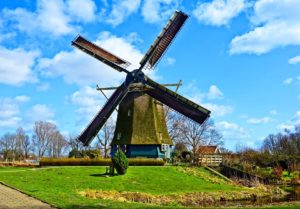
Taal is niet alleen belangrijk voor communicatie maar het vormt ook een belangrijk onderdeel van je afkomst, identiteit en culturele waarden en normen. Je moederstaal is soms de enige manier om precies uit te drukken hoe je je voelt. Mijn wens is dat iedereen zich in dit jaar meer bewust wordt van het belang van het behoud van je eigen identiteit, je eigen taal, waar ook ter wereld.
Language is not only important for communication but it also is an essential part of your inheritance, identity and cultural values and beliefs. Your native tongue is sometimes the only way to express exactly how you feel. My wish is that this year everyone becomes more aware of the importance to cherish and value your own identity, your own language, no matter where you are in the world.
Gaelic
Tá fáilte romhat! – You’re welcome!
Go mbeannaí Dia dhuit! – May God bless you!
To find out more on the International Year of Indigenous Languages, visit their website below:
International Year of Indigenous Languages
Photo Dutch Windmill by Mabel Amber obtained Pixabay. Used with permission.
I Have No Hands Now But Yours
September 6, 2019In this month’s reflection from the Little Brown Book Too, authors Sue and Leo Kane invite us to reflect on Saint Mary MacKillop’s deep love for those who lived in poverty.
Mary saw herself as blessed by the poor! Just as the Sisters named in this reflection were inspired by Mary’s love in action, we too are invited – and challenged – to live in Mary’s spirit today.
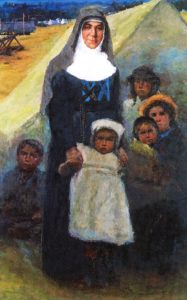 Mary certainly did this in her own life. ‘Our dear Foundress had an unparalleled love for God’s poor. I don’t think I’ve met any person with such great love for the poor,’ recalled Sister Cataldus*.
Mary certainly did this in her own life. ‘Our dear Foundress had an unparalleled love for God’s poor. I don’t think I’ve met any person with such great love for the poor,’ recalled Sister Cataldus*.
Sister Denis** fills out the picture: ‘One day. I happened to be her companion in Kent Street, Sydney. It seemed to me as if a great many poor people came to us in different parts of the street as we passed along. Many of them said, “God bless you.”
Mother said to me: “I love to get the blessing of these poor people.”
Mary understood that, deep down, we all have to face our own poverty. She had a real affinity with the poor, so much so that she saw herself as receiving from them. And, like Jesus, she set out to show them their own worth, while also assisting in practical ways.
In the tough environment of colonial Australia, Mary and her Sisters brought help to many in great need. Some even lived in tents on the goldfields among the miners. They valued and loved the poor.
We reflect today about what that means for us, especially in the affluent culture in which we now live.
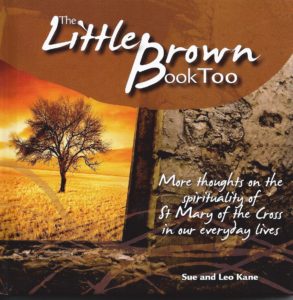 The above reflection is an extract from The Little Brown Book Too, pages 34-35
The above reflection is an extract from The Little Brown Book Too, pages 34-35
© Sue and Leo Kane 2011
Used with the kind permission of the publishers, St Paul’s Publications
Available on line and from Mary MacKillop Centres —
Click here for locations and contact details
Download the print version of this reflection (PDF)
Art: © Hongbin Zhao
The artist has written:
Mary MacKillop’s commitment to the service of those in need knew no boundaries. She was willing to go anywhere she could be of help. She and her Sisters also happily endured the living conditions of the people they helped and the children they taught. I have depicted Mary in the goldfileds with a group of children, bringing them hope and support in a difficult situation.
From: Mary MacKillop: A Tribute: © Honeysett Press, NSW 1995, page 79
Josephites Got Talent
September 5, 2019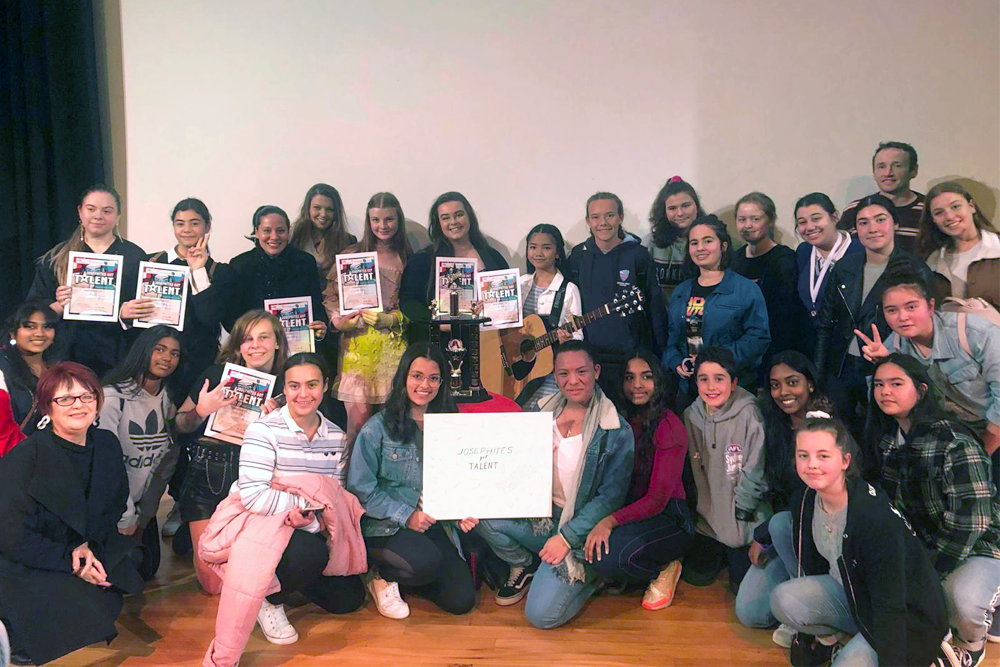
The talents of wonderful Josephite students from six high schools across New South Wales were shared on Friday 30 August in the first-ever Josephites Got Talent.
It was an epic display of the Josephite community and charism, as well as the immensely-talented youth! Holy Spirit Lakemba was so generous to host the event in their auditorium, which served as the perfect location for performers, Josephite sisters, teachers, principals, family and friends to join together and watch the many acts of the night.
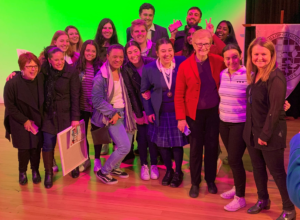
Masters of Ceremony, Emmanuel Garley and Jessika Lembryk, had the crowd dancing and laughing, and made for a truly fun night. Every single act of the night was inarguably astounding. From piano solos and dance troupes to singers and cultural dancers, it seemed to everyone that the judges had an incredibly tough decision ahead of them. The conclusion was made, and a just one at that, that every single school would receive a trophy.
Social Justice Awards were also awarded to six students, one from each respective school. The award recipients include Jackson Lantry, Maya T-Vega, Christiane Nakhle, Laura Mercer and Joelle Sassine. These students were acknowledged for their consistent dedication to social justice within their school and wider community, and a true embodiment of the Josephite spirit.
The night was an incredible opportunity for forming new friendships, learning about other cultures, and appreciating the wide variety of talents these students are blessed with. Such positive community events are a shining beacon of the Josephite legacy and are an example of how much good can come into the world from spreading happiness, joy and love with everyone we encounter.
Thank you to everyone who was involved in the organisation and coordination of the event, and to all six schools:
- Holy Spirit Catholic College, Lakemba
- Mount St Joseph, Milperra
- Holy Spirit College, Bellambi
- St Joseph’s Catholic College, East Gosford
- Mary MacKillop Catholic College, Wakeley
- MacKillop Catholic College, Warnervale.
Mikaela Jago
Year 11 Student
Mount St Joseph, Milperra
Sr Monica Cavanagh breaks ground at Redevelopment Project
September 4, 2019New Beginnings for St Anthony’s Family Care.
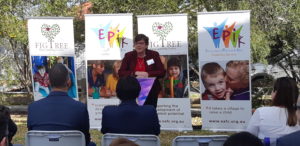 St Anthony’s Family Care has been meeting the needs of children and families in the inner west since 1952. A work of the Sisters of Saint Joseph, the once grand and imposing building located on Alexandra Avenue has lost its lustre over the decades and has struggled to meet current building codes and the changing demands of current service provision.
St Anthony’s Family Care has been meeting the needs of children and families in the inner west since 1952. A work of the Sisters of Saint Joseph, the once grand and imposing building located on Alexandra Avenue has lost its lustre over the decades and has struggled to meet current building codes and the changing demands of current service provision.
For the past 8 years, the prospect of re-developing the vast 5,500m2 site has been tossed around and various possibilities considered on how best to proceed with modernising the site. Plans were submitted to council and approval granted in March 2019.
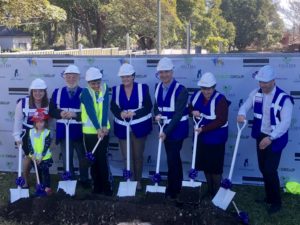 On Monday 2 September 2019, St Anthony’s Family Care held an official Ground-Breaking Ceremony to mark the start of the site redevelopment, a day long awaited by many. The event was well attended and Cr John Faker, Mayor of Burwood Council, Ms Jodi McKay, NSW Leader of the Opposition and Member of Strathfield, Sr Monica Cavanagh, Congregational Leader Sisters of Saint Joseph and Mr Jim Doyle, Chair of the Board all spoke at the official ceremony before donning hard hats and vests for the turning the soil.
On Monday 2 September 2019, St Anthony’s Family Care held an official Ground-Breaking Ceremony to mark the start of the site redevelopment, a day long awaited by many. The event was well attended and Cr John Faker, Mayor of Burwood Council, Ms Jodi McKay, NSW Leader of the Opposition and Member of Strathfield, Sr Monica Cavanagh, Congregational Leader Sisters of Saint Joseph and Mr Jim Doyle, Chair of the Board all spoke at the official ceremony before donning hard hats and vests for the turning the soil.
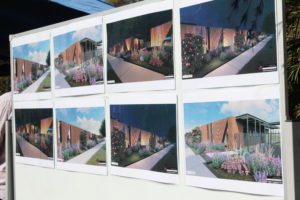 The new facilities to be constructed over the next 14 months include an 86 place Inclusive Early Learning Centre, 3 short term residences for young people with disabilities, an activity centre for children and young people with disabilities and administration building. The single storey village will offer many state-of-the-art facilities in a beautiful environment enabling St Anthony’s to continue to service the local community for many decades to come.
The new facilities to be constructed over the next 14 months include an 86 place Inclusive Early Learning Centre, 3 short term residences for young people with disabilities, an activity centre for children and young people with disabilities and administration building. The single storey village will offer many state-of-the-art facilities in a beautiful environment enabling St Anthony’s to continue to service the local community for many decades to come.
The site re-development is being fully funded through many years of support from giving donors and has not received any government funding. It will be wonderful to have new fit for purpose facilities available to the children and families who use St Anthony’s services.
Lifetime of caring for the vulnerable fuelled by Gospel values
September 3, 2019Inspirational Woman: Dr Robyn Miller, Chief Executive Office of MacKillop Family Services.
Dr Robyn Miller has devoted her career not only to caring for vulnerable families and children, but also helping change the system to allow for early intervention which supports families who are struggling and helps prevent and treat trauma that can lead to break-down.
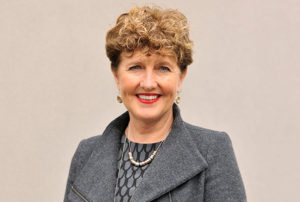
Robyn is the Chief Executive Officer of MacKillop Family Services, which provides specialist services to vulnerable and disadvantaged children, young people and their families in Victoria, New South Wales and Western Australia. MacKillop also provides training nationally on trauma-informed practice and education.
She has 30 years’ experience in community services, local government and child protection sectors, and has practised in both the public and private sectors as a therapist, clinical supervisor, consultant and lecturer.
From 2006-15 Robyn provided professional leadership as the Chief Practitioner within the Department of Human Services in Victoria, was a member of the Victorian Child Death Review Committee for 10 years and worked as a consultant with the Royal Commission into Institutional Responses to Child Sexual Abuse. She is a board member of Catholic Professional Standards Ltd and Catholic Social Services Australia, and was the recipient of the inaugural Robin Clark PhD Scholarship in Victoria.
Robyn, who was born and raised in West Preston in Melbourne and educated by the Good Samaritan Sisters, says she always had a strong interest in social justice.
Robyn says she was always interested in youth work and after school she completed a four year degree in Psychology and Social Work.
Robyn’s passion for improving social support systems was partly sparked through her own family experience.
Continue reading the article here
Debra Vermeer
Author
Women Matter Newsletter a publication of the National Office for the Participation of Women
Consciousness of the Cosmos
September 2, 2019Elaine Wainwright suggests readings and activities to raise our consciousness of Earth and the cosmos during the Season of Creation.
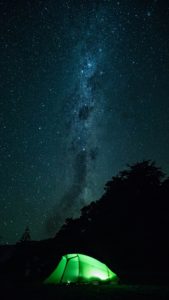 The month of September is now the Season of Creation, an annual celebration of prayer and action to protect creation. It begins on 1 September with a day of Prayer for Creation and concludes on 4 October, the feast of Francis of Assisi, the patron saint of ecology in many Christian traditions. Here I focus on Cosmos Sunday in the Season of Creation and reflect on the three biblical texts for the day…
The month of September is now the Season of Creation, an annual celebration of prayer and action to protect creation. It begins on 1 September with a day of Prayer for Creation and concludes on 4 October, the feast of Francis of Assisi, the patron saint of ecology in many Christian traditions. Here I focus on Cosmos Sunday in the Season of Creation and reflect on the three biblical texts for the day…
Continue reading the article below:
Tui Motu Issue 241, September 2019 (PDF)
National Child Protection Week 2019
September 1, 2019Celebrating the theme that parenting is like navigating waters…

Becoming a parent has been an incredible ride, and nothing prepares you for it, that intense love you feel for the little creature you have created and the patience you have (at times). There are times when it is overwhelming, and when the saying “it takes a village to raise a child” is so very true. Knowing when you need a break or to simply walk away, this takes supreme inner strength – and having the support to do it, is the most empowering thing in the world. But unfortunately, not all parents have the luxury of wisdom and strength to know when to walk away, nor support on hand to be able to get away for their sanity.
In 2014 the New Zealand government introduced the Children’s Act. This act made sweeping changes to how the New Zealand government would protect vulnerable children, and help them to thrive, flourish and belong.
For me, this meant some changes, but it wasn’t just me. I’m a paramedic working on the ambulance front line. These changes affected everyone that comes into contact with children in the health, education, justice sectors and local and central governments. All these people had to be security vetted again. Training on how to identify vulnerable children and how to report such concerns were given.
New Zealand has horrific child abuse and child death rates. There is always something in the news about a child who has been taken to hospital with non-accidental injuries. It makes me so sad, and it makes me think how can one human do this to a defenceless child?
 I have come to find that in an emergency, in the heat of the moment, the focus is on saving a life, and the finer details of what has happened are not shared, or they are withheld willingly.
I have come to find that in an emergency, in the heat of the moment, the focus is on saving a life, and the finer details of what has happened are not shared, or they are withheld willingly.
Thankfully in all my years of prehospital work, I have only been involved in one serious case of inflicted injury on a baby. I wasn’t entirely sure what was going on with this baby at the time, but subconsciously I must have known. During the transport of this wee boy, I felt this overwhelming need to speak to him all the way to hospital, and shower him with love, reassurance and calming words. I was now his advocate, and his protector, and I would deliver him safe to my colleagues at the hospital emergency department so they could do all that they could do to keep him alive.
Thinking about what he had endured helped me find the strength and courage to attend court later when I was called as a witness in the accused’s trial. If this baby could have survived months of hate and abuse at the hands of the perpetrator, I could definitely give a day of my life to speak for him.
I am grateful for the opportunity that we as paramedics have – what I see as a special role. We make up a group of only a few outsiders who get to glimpse into the home when it hasn’t been prepared to be scrutinised. If my colleagues and their observations of a child can save them from abuse or worse, you can count on us.
Rebecca Gilroy
Visit the National Child Protection Week website
Right photo by Asad Photo Maldives obtained from Pexels. Used with permission.
Left photo by andres chaparro obtained from Pexels. Used with permission.
Father’s Day 2019
From a Josephite point of view, there can be no better example of what Father’s Day should encapsulate.
 Here we have the Christian religion’s “father of all fathers” taking care of the “son of all sons”. One assumes that a father is to provide for his wife and family. Regardless of how the modern family unit has been denigrated (if that is not too strong a word), the common belief is that the parent(s) are to take care and nurture the child(ren) of that union. If that is still to be taken as a base fact, then the “Holy Family”, of which Joseph and Jesus were members, provides us with a platform upon which we can base our assumptions of what is now known as Father’s Day.
Here we have the Christian religion’s “father of all fathers” taking care of the “son of all sons”. One assumes that a father is to provide for his wife and family. Regardless of how the modern family unit has been denigrated (if that is not too strong a word), the common belief is that the parent(s) are to take care and nurture the child(ren) of that union. If that is still to be taken as a base fact, then the “Holy Family”, of which Joseph and Jesus were members, provides us with a platform upon which we can base our assumptions of what is now known as Father’s Day.
It is really of no consequence to go into history to try and establish when, what we have today, was first “set in concrete”, suffice to say that while the intention was well meant, (as with Mother’s Day), the extension of that well-meaning has developed into full blown commercialism.
Only every so often in the mindless and endless tirade of advertising catalogues in the snail mail post, the television screens and phones are there any semblance of the “real” meaning of the day. Dad/father is depicted as a loving protector of the children in the catalogues and while the pipe and slippers image has disappeared due to the anti-cancer crusade against smoking, the message is still very clear…spend up big on your dad, give him multiple presents because he deserves it for the role he plays in guiding the family through the maze of difficult situations that confront the modern family. Most honourable!
If we can cast our mind back to Joseph however, I hardly think the “Nazareth Times” would have been running specials of any sort. Any advertising done in any way shape or form would have been by personal example. It was the clearest and most striking way of demonstrating anything. Family values were no exception.
Remembering that there was some degree of confusion and, I dare say, “tittle tattle” surrounding Joseph and his fatherhood status, (“betrothed to a maiden called Mary”) it was absolutely essential that whatever Joseph did, had to be “above board” to all the local townsfolk as that special family came into the town, settled down and began the ordinary process of living as all the other families in the town were doing. Nothing very much seems to be clearly known about the first 12 years of Jesus’ life so that suggests that Joseph must have been doing a very good job at providing for his wife and son. Nothing untoward happened until “the Temple lectures”.
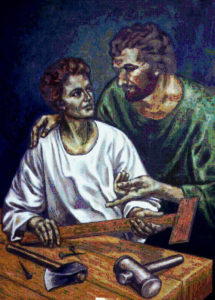 In their house, Joseph must have been tutoring Jesus in the skills of woodworking, manners, social communications and reverence to their God. Perhaps it was these human qualities that Joseph instilled into Jesus in those early years – with the undeniable help of Mary – that led Jesus to develop an uncanny understanding of human behavioural traits…. which were to cause him so much anguish in his adult life.
In their house, Joseph must have been tutoring Jesus in the skills of woodworking, manners, social communications and reverence to their God. Perhaps it was these human qualities that Joseph instilled into Jesus in those early years – with the undeniable help of Mary – that led Jesus to develop an uncanny understanding of human behavioural traits…. which were to cause him so much anguish in his adult life.
As far as Joseph was concerned, he had discharged his duty as “head of the family” and perhaps the only present he ever got from Jesus (the human Jesus) was a wink and a smile when some client had bought a piece of crafted wood and was pleased with it.
Sometimes a smile says more than any bought gift….Father’s Day.
Laurie Mayne
Photo of Father’s Day image obtained from Pxhere. Used with permission.
